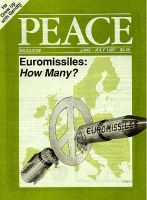
Peace Magazine Jun-Jul 1987, page 34. Some rights reserved.
Search for other articles by Anthony Bond here
Gale Warner and Michael Shuman. Toronto: Collier-Macmillan, 1987 (379 pp)
No other peace book has so inspired me or grabbed my attention: Citizen Diplomats is quite simply the most compelling call to action yet written on East-West relations. It features nine well-known and unknown U.S. citizen diplomats, concluding with the moving, real life fairy tale of Samantha Smith. The capper is the 77 page What You Can Do appendix, with write-ups on 38 different types of citizen diplomacy and 285 organizations. After this, only the thick skinned can fail to heed the call.
To the Soviets, America's best known diplomat is Armand Hammer, already a millionaire when he started doing business with Lenin in the 1920's and, except for a hiatus during the Stalin years, is still making deals with the Soviets. He's also a tireless peace broker, shuttling between heads of state like a Kissinger, and thus an easy target for cynics. Hammer, however, says simply: "If you trade with somebody, it's pretty hard to fight with them." That philosophy is shared by John Chrystal, an Iowa farmer turned banker, who for 27 years has travelled to the USSR to help improve Soviet food production. Respected by conservative Iowans and Soviets alike, he has hosted innumerable delegations of their agricultural officials, including Gorbachev himself. "If we can't stop the arms race... we're heading for a real economic disaster, " he says.
Citizen diplomacy is such a fast growing field that preparing the book was like "documenting the progress of a forest fire," write the authors. Americans are now eager to educate themselves about the Soviets, who, for their part, have always been interested in things American: four million Soviets are learning English, against 25,000 Americans learning Russian. Moreover, the Soviet people like Americans. They admire and mimic their culture and an American accent is considered chic. "Yet they believe the U.S. is a virtual war zone with race riots, poverty, hand gun anarchy and political corruption." Unfortunately, the preconceptions of life in the USSR by citizen diplomat Sharon Tennison are still shared by too many Americans:
"Bleak. Controlled. Desperate. Desolate. Robot-like people, who never smiled, who had no emotions, who were totally subservient to an evil government." After visiting the USSR, however, she says, "If I could stick any American into my back pocket and take them along with me -- including President Reagan and Cap Weinberger -- they would be changed human beings, with changed international policies, by the time we were finished."
Once the “just like us" phase is over, the real work begins, says Tennison. "There is a constant balance between our urge to be critical with our need to just learn." Says Cynthia Lazaroff, a leader of Soviet-American wilderness programs for teenagers, "It was difficult for the Americans to accept that while the Soviets loved rock'n roll, enjoyed wearing blue jeans and were curious about life in America, they were not anxious to become just like Americans." Says one American teenager, "I thought by this time we'd be winning them over."
"They seem to experience life at a level of emotional depth that we seldom do here," says Tennison. "It's easier for us to avoid the harsh realities of life. We can skip out on things we don't like.. that's not possible in the Soviet Union. People have to work out their conflicts with each other. The only way they've been able to survive is by sticking together." There are other differences. "The Soviets go for the big picture, emphasizing the general over the particular, stability over change... Americans emphasize specificity of content, adaptability, change and novelty of approach," says Jim Hickman, organizer of U.S.-Soviet Spacebridges. "The U.S., a nation largely composed of immigrants seeking religious, economic and personal freedom from authorities in the old country, cherishes personal freedom above all," says Tennison. "The Soviet Union, a country that for a thousand years has suffered repeated invasion, cherishes collective security above all."
Tennison was asked by Anna, her hostess: "What do you think of us?" A charged, vulnerable silence filled the room. "You've had to deal with tragedy on a scale that few other people have known... your suffering has produced a spiritual depth, an ability to create connections that touches me deeply." Another powerful silence filled the room. Anna's face was streaked with tears. "You have seen into our heart," she whispered. "How have you done that when so many have come and not understood?"

Peace Magazine Jun-Jul 1987, page 34. Some rights reserved.
Search for other articles by Anthony Bond here